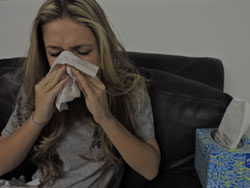According to a report released by the New Jersey Department of Health and Care, there were high levels of influenza activity throughout the state in January. Monmouth County is the highest flu-infected county within New Jersey with a total of 135 cases thus far.
Last year’s flu reported cases were nearly two times less with only 82 cases around this time last year according to an Influenza Laboratory Report by the New Jersey Department of Health Communicable Disease Service.
“The flu is a contagious respiratory illness caused by influenza viruses that infect the nose, throat, and lungs. It can cause mild to severe illness, and at times can lead to death. The best way to prevent the flu is by getting a flu vaccine each year,” according to the Centers for Disease Control and Prevention (CDC) website.
The University Health Center and their healthcare providers sponsored two flu vaccination clinics–one in early October and another in early November. The clinics vaccinated a total of about 600 students and employees.
“Quite simply, a lot of folks have the flu,” said Kathy Maloney, Director of Health Services. Ever since the semester began, she and fellow doctors have been inundated with students afflicted with influenza and ‘influenza-like illnesses’- a term that describes possible cases not confirmed by tests.
When the outbreak began, Maloney, and her fellow staff were tasked with measuring its full extent. “As a Sentinel Provider [any group or office tasked with monitoring flu outbreaks] for both the CDC and the New Jersey Department of Health, we were given three rapid flu kits, together consisting of 66 tests. These were meant to detect initial cases; since then every single one has been used. So now we are treating based on symptoms,” she said.
“My roommate had the flu a week ago,” said Chris Laspina, a sophomore commercial real estate student. “He was out for around five days, and he had to go home because he wasn’t able to go to class. I’ve also noticed that lots of people on Facebook have been mentioning that they’ve come down with the flu. Last year, I heard nothing.”
In a letter to parents about seasonal influenza preparedness, Mary Anne Nagy, Vice President for Student Services wrote, “In order to maintain a healthy campus environment and to prevent influenza and its complications, we urge you to discuss with your student the value of receiving an annual flu shot. By taking this proactive step, your student can prevent needless time away from academic studies and work.”
Symptoms of the virus are varied, and are often different from person to person. “We’ve typically seen people who come in with high fevers, sore throats, lots of congestion, and some coming with all these plus vomiting and nausea,” said Maloney.
The CDC’s website also mentioned that flu viruses spread mainly by droplets made when people with the flu cough, sneeze or talk. These droplets can land in the mouth or noses of people who are nearby. Less often, a person might also get the flu by touching a surface or object that has flu virus on it and then touching their own mouth, eyes or possibly their nose.
There are a number of ways everyone is able to prevent or deter the flu virus from attacking their immune system. According to Maloney students can attempt to prevent the flu by getting plenty of sleep, maintaining good nutrition, good handwashing, and proper disposal of used tissues.
A factor that affects the spread of the flu is how many students are vaccinated, as well as how effective the vaccination is. A flu vaccine is created yearly to deal with the strains that doctors believe will be the most common and troublesome in any given season.
Dr. Kathryn Lionetti, a professor of biology, explained how these vaccines work. “A vaccine is meant to prime the immune system, allowing it to raise the number of antibodies and sensitized T-cells which are able to fight off foreign bodies. Anything foreign that’s not normally found in our bodies, we call an antigen (antibody generator). Before we’re born, our bodies take stock of what does and doesn’t belong to us. The body is able to recognize what is ours and what is foreign.”
Many can attest to the effectiveness of vaccines including Carly Trill, a senior social work student. “This was the first year I got a flu shot,” she said. “A couple of my friends said they’d gotten really sick, but I’m doing quite well so far.”
Maloney is optimistic that the worst has passed and has seen a decrease in cases over the last few weeks. “There will still be a few cases until spring break; but afterwards the viral pattern should be broken,” she said.
However, both Lionetti and Maloney agree that there will surely be another epidemic next year, and in order to minimize your odds of the flu, they encourage students to get their flu shots. According to them, prevention is the best medicine.
IMAGE TAKEN by Alexandria Afanador



